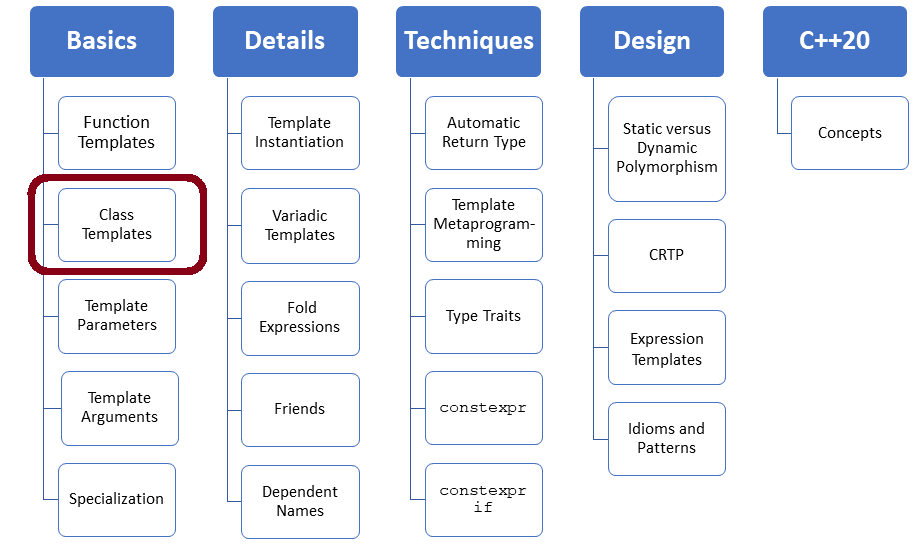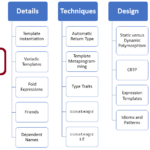Class Templates
A function template represents a family of functions. Accordingly, a class template represents a family of classes. Today, I want to introduce class templates.

Defining a class template is straightforward.
Definition of a Class Template
Assume you have a class Array that should become a class template.
class Array{ public: int getSize() const { return 10; } private: int elem[10]; };
The class Array holds a C-array of int with length 10. The type of the C-array and its length are obvious generalization points. Let’s make a class template by introducing a type parameter T and a non-type parameter N and playing with them.
 Modernes C++ Mentoring
Modernes C++ Mentoring
Do you want to stay informed: Subscribe.
// arrayClassTemplate.cpp #include <cstddef> // (1) #include <iostream> #include <string> template <typename T, std::size_t N> // (2) class Array{ public: std::size_t getSize() const { return N; } private: T elem[N]; }; int main() { std::cout << '\n'; Array<int, 100> intArr; // (3) std::cout << "intArr.getSize(): " << intArr.getSize() << '\n'; Array<std::string, 5> strArr; // (4) std::cout << "strArr.getSize(): " << strArr.getSize() << '\n'; Array<Array<int, 3>, 25> intArrArr; // (5) std::cout << "intArrArr.getSize(): " << intArrArr.getSize() << '\n'; std::cout << '\n'; }
The Array is parametrized by its type and its size. For size, I used the unsigned integer type std::size_t (2) that can store the maximum size. To use std::size_tI have to include the header <cstddef> (1). So far, the Array can be instantiated with an int (3) with a std::string (4), and with an Array<int, 3> (5). The following screenshot shows the output of the program.

You can define the member functions of a template inside and outside the class template.
Definitions of Member Functions
Defining the member function inside the class template is straightforward.
template <typename T, std::size_t N> class Array{ public: std::size_t getSize() const { return N; } private: T elem[N]; };
When you define the member functions outside the class, you have to specify that it is a template, and you have to specify the full type qualification of the class template. Here is the modified class template Array:
template <typename T, std::size_t N> class Array{ public: std::sizt_ getSize() const; private: T elem[N]; }; template <typename T, std::size_t N> // (1) std::size_t Array<T, N>::getSize() const { return N; }
(1) is the member function getSize of the Array, defined outside the class. Defining the member function outside the class template becomes challenging if the member function itself is a template.
Member Functions as Templates
A typical example of a generic member function is a templated assignment operator. The reason is straightforward. You want to assign an Array<T, N> to an Array<T2, N2> if T is assignable to T2 and both arrays have the same size.
Assigning an Array<float, 5> to an Array<double, 5> is not valid because both arrays have different types.
// arrayAssignmentError.cpp #include <cstddef> #include <iostream> #include <string> template <typename T, std::size_t N> class Array{ public: std::size_t getSize() const { return N; } private: T elem[N]; }; int main() { std::cout << '\n'; Array<float, 5> floatArr; Array<float, 5> floatArr2; floatArr2 = floatArr; // (1) Array<double, 5> doubleArr; doubleArr = floatArr; // (2) }
Assigning floatArr to floatArr2 (1) is valid because both arrays have the same type. Assigning floatArr to doubleArr is an error (2) because both classes have different types. The compiler consequently complains that there is no conversion from Array<float, 5> to an Array<double, 5>.

Here is a naive implementation of the class Array that supports the assignment of two arrays of the same length. The C-array elem is intentionally public.
template <typename T, std::size_t N> class Array{ public: template <typename T2> Array<T, N>& operator = (const Array<T2, N>& arr) { std::copy(std::begin(arr.elem), std::end(arr.elem), std::begin(elem)); return *this; } std::size_t getSize() const { return N; } T elem[N]; };
The assignment operator Array<T, N>& operator = (const Array<T2, N>& arr) accepts arrays that could vary in the underlying type but could not vary in length. Before I show the code in action, I want to improve it.
Friendship
To make elem private, it must be a friend of the class.
template <typename T, std::size_t N> class Array{ public: template <typename T2> Array<T, N>& operator = (const Array<T2, N>& arr) { std::copy(std::begin(arr.elem), std::end(arr.elem), std::begin(elem)); return *this; } template<typename, std::size_t> friend class Array; // (1) std::size_t getSize() const { return N; } private: T elem[N]; };
The line template<typename, std::size_t> friend class Array (1) declares all instances of Array to friends.
Member Function defined Outside The Class
Defining the generic member function outside the class is quite a job.
template <typename T, std::size_t N> class Array{ public: template <typename T2> Array<T, N>& operator = (const Array<T2, N>& arr); template<typename, std::size_t> friend class Array; std::size_t getSize() const; private: T elem[N]; }; template <typename T, std::size_t N> std::size_t Array<T, N>::getSize() const { return N; } template<typename T, std::size_t N> // (1) template<typename T2> Array<T, N>& Array<T, N>::operator = (const Array<T2, N>& arr) { std::copy(std::begin(arr.elem), std::end(arr.elem), std::begin(elem)); return *this; }
In this case, you define a generic member function (1) outside the class body; you have to specify that the class and the member functions are templates. Additionally, you have to specify the full type qualification of the generic member function. So far, the assignment operator is used for types T and T2 that is not convertible. Invoking the assignment operator with non-convertible types gives an ugly error message. I should fix this.
Requirements on the Type Parameters
The requirements can be formulated with the type traits library and static_assert (C++11), or with concepts (C++20). Here are the two variations of the generic assignment operator:
- C++11
template<typename T, std::size_t N> template<typename T2> Array<T, N>& Array<T, N>::operator = (const Array<T2, N>& arr) { static_assert(std::is_convertible<T2, T>::value, // (1) "Cannot convert source type into the destination type!"); std::copy(std::begin(arr.elem), std::end(arr.elem), std::begin(elem)); return *this; }
- C++20
Finally, here is the complete program using the concept std::convertible_to in the declaration (1) and the definition (2) of the member function.
// arrayAssignment.cpp #include <algorithm> #include <cstddef> #include <iostream> #include <string> #include <concepts> template <typename T, std::size_t N> class Array{ public: template <typename T2> Array<T, N>& operator = (const Array<T2, N>& arr) requires std::convertible_to<T2, T>; // (1) template<typename, std::size_t> friend class Array; std::size_t getSize() const; private: T elem[N]; }; template <typename T, std::size_t N> std::size_t Array<T, N>::getSize() const { return N; } template<typename T, std::size_t N> template<typename T2> Array<T, N>& Array<T, N>::operator = (const Array<T2, N>& arr) requires std::convertible_to<T2, T> { // (2) std::copy(std::begin(arr.elem), std::end(arr.elem), std::begin(elem)); return *this; } int main() { std::cout << '\n'; Array<float, 5> floatArr; Array<float, 5> floatArr2; floatArr.getSize(); floatArr2 = floatArr; Array<double, 5> doubleArr; doubleArr = floatArr; Array<std::string, 5> strArr; // doubleArr = strArr; // (3) }
When I enable (3), the GCC complains that the constraints are unsatisfied.
What’s next?
As you might imagine. I’m not done with class templates. Next time I will write about two tricky details: the inheritance of class templates and the instantiation of member functions of class templates.
The Next PDF-Bundle
I want to resuscitate an old service and create bundles of old posts. I will create the bundles only for my English posts because this is quite a job. These bundles include the posts, all source files, and a CMake file. To make the right decision, you have to make your cross. I will build the pdf bundle with the most votes. The vote is open until 30.05 (including). Vote here.
Thanks a lot to my Patreon Supporters: Matt Braun, Roman Postanciuc, Tobias Zindl, G Prvulovic, Reinhold Dröge, Abernitzke, Frank Grimm, Sakib, Broeserl, António Pina, Sergey Agafyin, Андрей Бурмистров, Jake, GS, Lawton Shoemake, Jozo Leko, John Breland, Venkat Nandam, Jose Francisco, Douglas Tinkham, Kuchlong Kuchlong, Robert Blanch, Truels Wissneth, Mario Luoni, Friedrich Huber, lennonli, Pramod Tikare Muralidhara, Peter Ware, Daniel Hufschläger, Alessandro Pezzato, Bob Perry, Satish Vangipuram, Andi Ireland, Richard Ohnemus, Michael Dunsky, Leo Goodstadt, John Wiederhirn, Yacob Cohen-Arazi, Florian Tischler, Robin Furness, Michael Young, Holger Detering, Bernd Mühlhaus, Stephen Kelley, Kyle Dean, Tusar Palauri, Juan Dent, George Liao, Daniel Ceperley, Jon T Hess, Stephen Totten, Wolfgang Fütterer, Matthias Grün, Phillip Diekmann, Ben Atakora, Ann Shatoff, Rob North, Bhavith C Achar, Marco Parri Empoli, Philipp Lenk, Charles-Jianye Chen, Keith Jeffery, Matt Godbolt, Honey Sukesan, bruce_lee_wayne, Silviu Ardelean, and Seeker.
Thanks, in particular, to Jon Hess, Lakshman, Christian Wittenhorst, Sherhy Pyton, Dendi Suhubdy, Sudhakar Belagurusamy, Richard Sargeant, Rusty Fleming, John Nebel, Mipko, Alicja Kaminska, Slavko Radman, and David Poole.
| My special thanks to Embarcadero |  |
| My special thanks to PVS-Studio |  |
| My special thanks to Tipi.build |  |
| My special thanks to Take Up Code |  |
| My special thanks to SHAVEDYAKS |  |
Modernes C++ GmbH
Modernes C++ Mentoring (English)
Rainer Grimm
Yalovastraße 20
72108 Rottenburg
Mail: schulung@ModernesCpp.de
Mentoring: www.ModernesCpp.org



Leave a Reply
Want to join the discussion?Feel free to contribute!